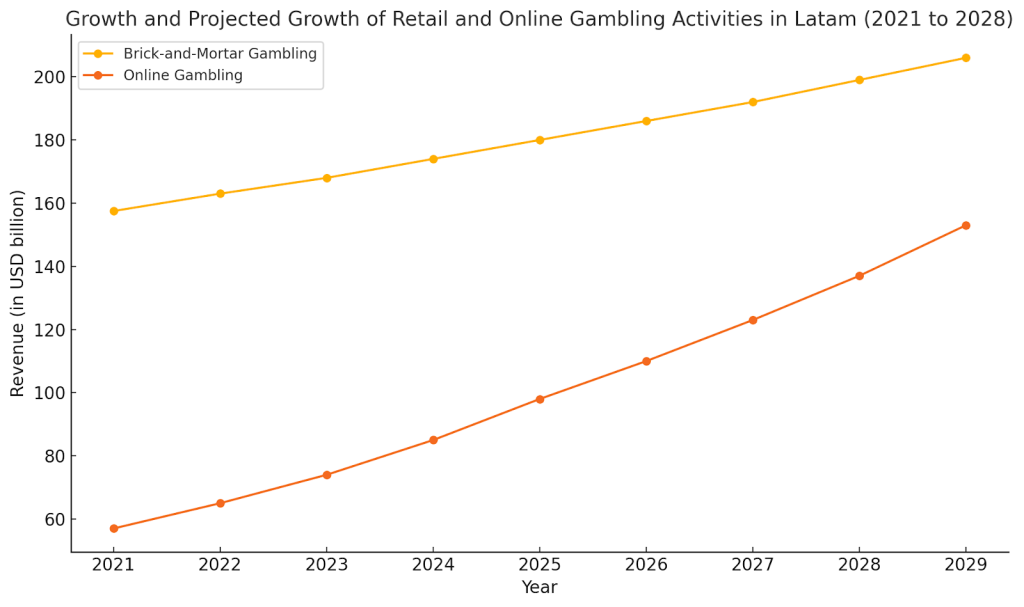The South American gambling scene has undergone a seismic shift since 2021, positioning the region as a focal point for iGaming operators worldwide. The convergence of regulatory reforms and technological advancements has energised sports betting to unprecedented levels, with the Latam online gambling market projected to quadruple in annual revenue by 2027.
Brazil's new regulatory framework for online gambling, launched on January 1, 2025, is set to impact the Latin American market significantly. Experts predict it could contribute half of the region's online gambling revenue. This development highlights the region's rapid evolution from an emerging market to a global heavyweight in the iGaming sector.
While the South American gambling market has surged in growth, the pace of expansion has brought its own drawbacks. Several regional governments are now grappling with the unintended consequences of this rapid development. Concerns over the societal impacts of gambling addiction, particularly among vulnerable populations, have taken centre stage.
These issues are compounded by debates surrounding the economic implications, including questions about equitable tax structures and whether the industry’s benefits outweigh its potential costs. Regulatory bodies throughout the region are introducing tighter controls and prioritising consumer protection measures to address these concerns.
Key Jurisdictions with Legalised iGaming
Overview of the leading markets driving the Latam iGaming boom in 2025.
Brazil
Brazil’s long-awaited regulation of fixed-odds sports betting represents a pivotal milestone for the country’s gambling sector. Key provisions include a licensing fee of 30 million reais (approximately €4.8 million) and an 18% gross gaming revenue (GGR) tax, which creates a structured and transparent framework for operators.
To be compliant, operators must meet strict licensing requirements which focus on fraud prevention, consumer protection, and responsible gambling. Measures include implementing player safeguards such as deposit limits and ensuring transparency in advertising to prevent the targeting of vulnerable populations. Such standards aim to promote a more sustainable gambling environment while enhancing market credibility.
With gross gambling revenues projected to reach $2.9 billion in 2025, Brazil is positioned as South America's largest and most influential market. This regulatory progress signals immense opportunities for operators while setting a benchmark for Latam’s evolving gambling landscape.
Colombia
Colombia emerged as a trailblazer in South America's online gambling sector, establishing a comprehensive regulatory framework in 2016. Under the governance of Coljuegos, the industry has experienced consistent growth supported by clear and stable regulations.
Since 2021, the nation has continued to refine its gambling laws, implementing stricter anti-money laundering measures to enhance the market's integrity. In addition, introducing new gaming verticals, such as virtual sports and eSports betting, reflects the country's commitment to staying abreast of global trends.
With over 17 licensed operators, Colombia boasts high market penetration, with online gambling revenues projected to exceed $1 billion by 2025. The nation's early adoption and progressive approach offer valuable insights for other jurisdictions aiming to develop lucrative iGaming markets.
Argentina
Gambling regulation operates under a decentralised framework in Argentina, with each province managing its own policies. Notably, both the province and city of Buenos Aires have been proactive in this sector in recent times. In 2021, they introduced online gambling licences, bringing greater structure and oversight to the market.
Taxation varies by region. Buenos Aires province imposes a 10% GGR tax, while the city enforces a higher rate of 25%. Recently, there has been a push for increased collaboration among provinces to harmonise operations and create a more cohesive market environment.
Projections indicate that Argentina's iGaming revenues could reach 840 billion Argentine Pesos (ARS) (approximately €2.35 billion) by 2025. This growth presents significant opportunities for operators to tailor offerings to the unique preferences of each province to enhance engagement and market penetration.
Peru
In 2022, Peru enacted its first comprehensive online gambling and sports betting legislation, launching a new era for iGaming. Regulations have driven a surge in investor confidence, as the government’s focus on transparency and anti-money laundering measures has created a safer, more attractive environment for business.
Operators are subject to a 12% GGR tax, the proceeds of which are directed toward public welfare programs. The regulations strongly emphasise transparency and player protection, encouraging a safer market and enhancing consumer confidence.
Market projections indicate a compound annual growth rate (CAGR) of 3.6%, with revenues expected to reach €1.82 billion by 2025. This growth presents substantial opportunities for new operators to enter Peru's stable regulatory environment and engage with its expanding player base.
Chile
Chile is steadily moving towards formal online gambling regulation, with draft legislation introduced in 2021 still under deliberation. While current operations exist in a grey area, that’s to say, technically unregulated but tolerated, there is growing momentum to bring structure and transparency to the market.
The Ministry of Finance has prioritised developing a framework that includes licensing requirements and a 10–20% GGR tax to formalise the sector and generate public revenues.
This ongoing uncertainty presents challenges for operators, but once enacted, new regulations are expected to unlock significant opportunities, tapping into a player base with high demand for legalised online gambling. With the new framework, Chile could position itself as a prominent market in South America, attracting both regional and global operators.
Costa Rica
Costa Rica has long been a hub for online gambling operators owing to its lenient regulatory environment. Rather than issuing specific online gambling licences, the country allows operators to register as data processing businesses, providing significant operational flexibility. Despite ongoing discussions about implementing more stringent regulations to align with international standards, no significant legislative changes have been enacted so far.
In recent years, the Costa Rican government has discussed implementing more stringent regulations to align with international standards and enhance the industry's legitimacy. However, no significant legislative changes have been implemented, and the regulatory framework remains largely unchanged.
The current market conditions offer operators both opportunities and challenges. The lack of formal regulation provides operational flexibility but raises concerns regarding legitimacy and player trust. Operators should remain vigilant and monitor potential regulatory developments impacting operational issues.
Mexico
Mexico's online gambling market operates under the Federal Gaming and Raffles Law, overseen by the General Directorate of Games and Lotteries. While the law permits online gambling, it lacks specific provisions tailored to the digital landscape, leading to a somewhat ambiguous regulatory environment. Operators typically collaborate with locally licensed partners to navigate these complexities.
In recent years, the Mexican government has discussed modernising the existing gambling laws to address online operations better and enhance regulatory clarity. However, no significant legislative reforms have been forthcoming, leaving the market to function under the existing framework.
Despite regulatory ambiguities, Mexico's online gambling market continues to grow. Driven by a large population with increasing internet penetration and a cultural affinity for gaming, the market generates over €1.57 billion annually and continues to expand. This growth highlights the region's growing digital adoption and presents substantial opportunities for operators to engage a diverse and enthusiastic player base.
Rest of Latin America
Across the region, the economic potential of regulated online gambling is being increasingly recognised. Still, many countries remain in the early stages of development or face significant obstacles to implementing it.
Ecuador, for example, has made significant strides with its recent licensing framework for sports betting, signalling a shift toward structured oversight. This development contrasts sharply with countries like Venezuela and Guyana, where economic instability and limited regulation hinder market growth. Similarly, Suriname and Paraguay operate with underdeveloped frameworks, leaving operators to navigate largely unregulated markets.
Throughout Central America, nations like Honduras, El Salvador, Nicaragua and Guatemala have yet to formalise comprehensive online gambling regulations. While these countries show potential, their reliance on informal operations underscores the need for stronger legal foundations. The lack of consistent oversight across the region creates challenges for operators seeking market legitimacy and long-term stability.
Despite these issues, the overall market conditions are promising. Increased internet penetration and the popularity of mobile betting are driving demand, particularly in culturally gaming-friendly environments. As governments explore ways to regulate and tax this growing industry, opportunities for both local and international operators are emerging. However, businesses entering the region must carefully evaluate each jurisdiction’s regulatory landscape to leverage opportunities while mitigating risks.
Legislative Developments Across the Region
Latin American countries have been steadily overhauling their online gambling regulations to balance market growth with player protections. Brazil, for instance, has implemented measures to curb the surge in online sports betting addiction, including blocking unauthorised websites and prohibiting credit card use for betting activities.
Taxation policies also greatly influence market dynamics. New regulations introduced in Brazil impose a substantial fee on betting companies seeking authorisation and require strict compliance to prevent fraud and money laundering.
The influence of global operators is evident as they adapt to these evolving regulations, impacting local policies and market standards. A notable case in point is Flutter's acquisition of a majority stake in Brazil's NSX Group, which signals a strategic move to expand within the regulated market.
Overall, Latin America's framework for regulations is rapidly evolving, with countries across the region striving to create secure and attractive environments for both operators and players. Moving forward, the ongoing developments indicate a positive trajectory towards a mature and responsible gaming industry.
Market Growth and Projections
Online gambling now accounts for a substantial portion of the sector’s revenues, driven by increasing internet penetration and mobile adoption. In countries like Colombia and Brazil, online platforms dominate market expansion, contributing a commanding percentage of overall gambling revenue. While still very significant, retail gambling has seen a gradual decline as players shift towards the convenience of digital channels.
This diverging trend highlights the importance of adapting to a tech-forward audience while acknowledging the steady, albeit slower, role of brick-and-mortar establishments in regions with strong cultural ties to physical casinos and betting shops.

Technological advancements have played a crucial role in the region’s growth. The integration of fintech solutions has streamlined payment processes, enhancing user experience and trust in online gambling platforms. Moreover, sophisticated gaming technologies, such as those provided by Altenar, have elevated the quality and variety of offerings available to players. For instance, Altenar's state-of-the-art sportsbook software delivers a comprehensive and customisable betting experience, catering to the diverse preferences of Latin American users.
As the market continues to evolve, operators and investors are keenly observing these technological trends and consumer behaviours to capitalise on the growing opportunities within the Latin American gambling environment.
Discover how fintech innovation and customisable solutions can drive growth for your operation. Schedule your software demonstration today to take advantage of the region’s expanding opportunities.
Disclaimer
This information is not intended to be legal advice and is solely extracted from open sources. It should not be relied upon as a substitute for professional legal advice and Altenar does not accept any liability concerning its use.













